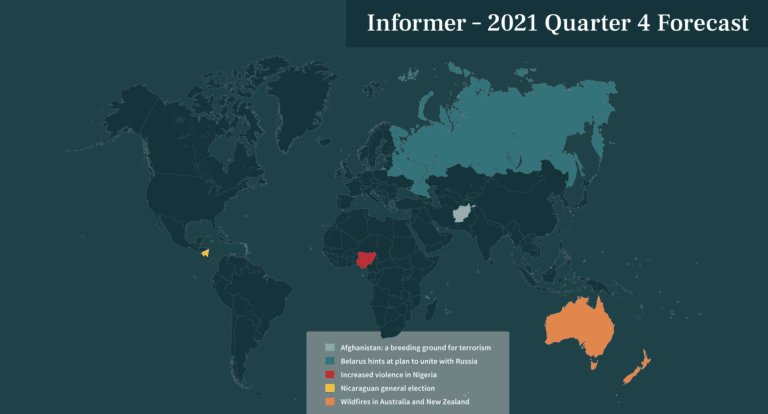Afghanistan: a breeding ground for terrorism
The end of the United States (US) occupation of Afghanistan has emboldened anti-US militant groups and delivered the country into the hands of the Taliban. There is little US leverage to compel the Taliban to honor commitments to disentangle themselves from al Qaeda, and even less on-the-ground intelligence to direct counter-terror operations from “over the horizon,” a euphemism which belies just how much less accurate such strikes will be in the future.
The Taliban however find themselves in the position of wanting international recognition, which for their own self-interest will require some moderation on their part. In addition, the rival Islamic State-Khorasan (IS-K) militant group remains implacably opposed to both the US and Taliban. The Taliban are already beginning to face the same challenge from IS-K’s hit and run attacks in major cities that the former Afghan government also faced. It is unlikely that the US and Taliban will ever directly cooperate in the suppression of IS-K, but there is precedent for tacit cooperation and intelligence sharing.
Belarus hints at long-running plan to unite with Russia
On 9 September, President Vladimir Putin of Russia and President Alexander Lukashenko of Belarus announced a strengthening of their countries’ economic relations, agreeing to the implementation of 28 joint programmes, notably in the financial, energy, agricultural and industrial sectors, to revive the Union State of Belarus and Russia, an entity which has existed since 1999 but never actually brought the two countries under one government.
President Lukashenko’s bellicose foreign policy, including the trafficking of immigrants from the Middle East through his country to its neighbours to spite them for imposing pro-democracy sanctions on Belarus, will be the norm going forward. Unanimously condemned by Western countries for forcing the landing of a Ryanair flight to arrest a dissident in May 2021, Belarus has again fallen back into the fold of Moscow, which seems to be undertaking a soft annexation through economic means.
It is however unlikely that the Union State will advance beyond a sabre-rattling point against Western Europe and a trojan horse for further Russian investment in the Belarusian economy.
Increased violence in Nigeria
An increase in abductions and ambushes indicates that Nigeria’s security strategy has deteriorated since the beginning of the COVID-19 pandemic, which came on top of an entrenched economic recession that began in 2016. Approximately 50 percent of 15-24 year old males are unemployed and gangs, bandit groups and militants have successfully filled the employment gap for this vulnerable demographic.
Increased activity by these groups is exacerbated by localised ethnic and land disputes to create a near-nationwide state of violence as deadly incidents continue to occur on a near-daily basis. Boko Haram and the splinter group, Islamic State West Africa Province (ISWAP), have created mass instability in the northeastern Borno and Yobe states, displacing millions destabilising communities and shattering local economic networks.
Bandit groups, which attract untrained young men to carry out financially lucrative crimes, including the seizure of vehicles and weapons from the security forces and abduction for ransom as well as cattle rustling, are active across multiple states. The current state of instability will continue as the government is unable to effectively address the dire economic situation and security services have proven unable to suppress the violence.
Nicaragua general elections
Ahead of the 7 November general election, the Nicaraguan regime – led by President Daniel Ortega and his wife and vice president Rosario Murillo since 2007 – has embarked on an unprecedented and violent crackdown of opponents. Dozens of opposition figures have been detained on politically motivated charges or forced into exile.
The wave of repression is not limited to arrests. Ortega exerts control over the security forces, the judiciary and the electoral council. The clampdown of the 2018 anti-government protests left over 300 people dead, forcing over 108,000 Nicaraguans to flee the country.
In response, the United States and the European Union have imposed restrictions on senior Nicaraguan officials. Economic sanctions alone are, however, unlikely to trigger change if the opposition remains fragmented. While the election is likely to go in the Ortegas’ favour, low-level unrest will continue as well as displacement and mass migration exacerbated by the costs of climate change and corruption.
Wildfires in Australia and New Zealand
The bushfire season in Australia and New Zealand usually runs between October and April. From October 2019 to February 2020, at least 34 people were killed and over 5,900 buildings were destroyed in bushfires across Australia. The bushfires in New Zealand were much less catastrophic when compared to Australia in recent years due to cooler temperatures, although around 50 homes were razed due to fire in Lake Ohau, Canterbury, in early October 2020.
Bushfires in Australia and New Zealand will be more intense and last longer in 2021 and early 2022 due to climate change. Areas prone to bushfires are dense bushlands in Australia’s New South Wales, Australian Capital Territory, Queensland, Victoria, Western Australia, Tasmania and South Australia, and New Zealand’s Auckland, Canterbury, Otago, Tasman and Waikato regions.
Both countries have effective warning systems and efficient personnel who respond quickly to incidents, but bushfires have the potential to cause unplanned power outages, and travel disruptions. High levels of smoke pollution from bushfires have the potential to halt business activities and make people more susceptible to ailments like COVID-19 by aggravating their lungs.
Stay up to date with our Informer articles.
